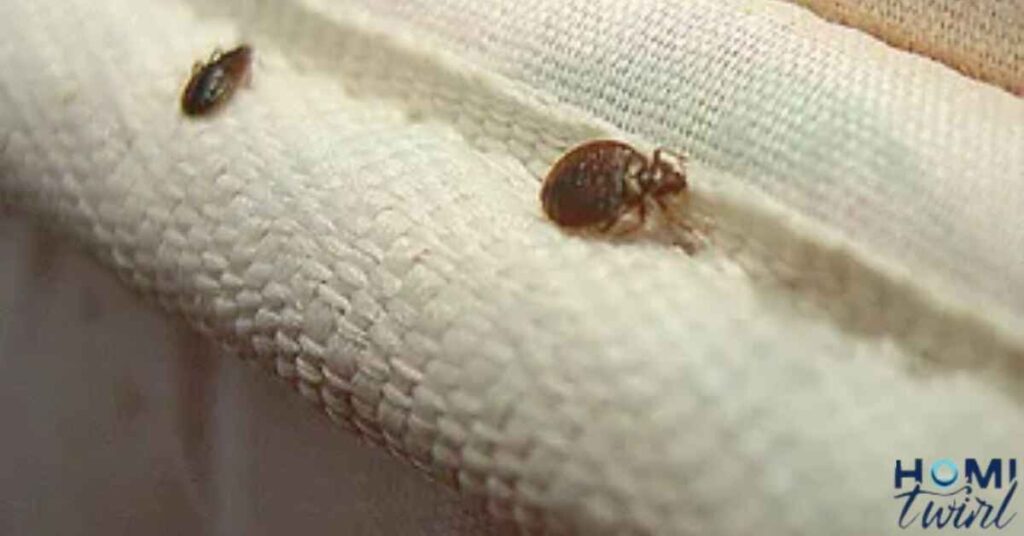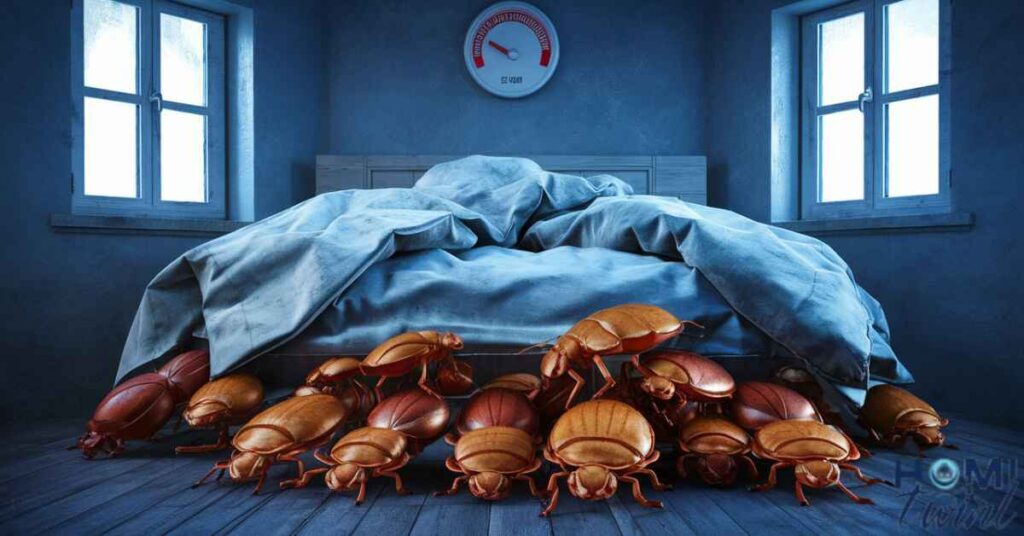When it comes to bed bugs and their preferences, the question arises: do they like cold rooms? Contrary to popular belief, bed bugs can indeed survive in cooler temperatures. Their ability to adapt to varying conditions allows them to thrive even in colder environments.
Originating from ancestors that dwelled in caves, feeding on bats, bed bugs have evolved to withstand cooler climates, extending their lifespan in the process. Despite their resilience to cold, freezing remains a viable control method.
However, it’s essential to note that freezing infested items requires meticulous execution, with temperatures of zero degrees Fahrenheit or lower sustained for at least four days.
Can Bed Bugs Thrive In Cold Temperatures?

Despite their tiny size, bed bugs are notorious pests that can survive in less-than-ideal conditions. While heat treatments are a common remedy, these hardy insects can also withstand surprisingly cold temperatures. Let’s explore the cold-hardy nature of bed bugs and what you can do to protect your home.
Read This Blog: HOW TO REFINISH BATHROOM VANITY
The Cold-Hardy Nature of Bed Bugs
Bed bugs didn’t get their resilient reputation by accident. These pests evolved to live in caves, feeding on the blood of bats in cooler environments. This ancestry gives them higher cold tolerance than many other insects.
Bed Bugs and Temperature
Ideally, bed bugs thrive in temperatures between 70-90°F. However, they can go dormant and stop feeding when exposed to extreme heat or cold, allowing them to adapt to temperature changes and survive.
Can Bed Bugs Live in the Cold?
Absolutely. Bed bug infestations are common even in the winter months across various cold climates. These insects can withstand temperatures as low as 14°F for several days. Below that, their survival rate starts to drop off drastically.
Using Cold Temperatures to Kill Bed Bugs
While bed bugs can tolerate the cold, strategic use of freezing temperatures can be an effective control method for certain infested items.
Freezing Bed Bugs
Here are some tips for freezing bed bugs to eliminate them.
- Use an actual freezer, not outside winter conditions which can fluctuate
- Items must remain in a freezer set to 0°F or below for at least 4 days
- Avoid freezing delicate items like electronics that could get damaged
Removing Bed Bug Infestations
The downside of freezing is that it may not be practical for larger household items like mattresses or upholstered furniture. And even if you freeze some belongings, they could easily get re-infected without treating the entire home.
Professionals recommend thorough heat treatments as the most effective way to fully eliminate bed bug infestations throughout a residence.
Protect Your Home from Bed Bugs

Are Bed Bugs Nocturnal? | Do Bed Bugs Only Bite At Night?
Bed bugs are primarily nocturnal, doing most of their feeding at night when their hosts (i.e. humans) are asleep and still. However, they can feed anytime if given the opportunity.
Also Read This Blog: WHAT COLOUR GOES WITH BEIGE BATHROOM TILES
If you wake up with strange bite marks, especially in a line or zig-zag pattern, it could be a sign of bed bugs biting at night while you slept.
Do Bed Bugs Hide in Pillows? | Signs of Bed Bugs
Absolutely – bed bugs love to hide in pillows, mattresses, box springs, and any crevice of upholstered furniture near where humans sleep. Other common hiding spots include.
- Baseboards
- Electrical outlets
- Dresser drawers
- Behind peeled wallpaper or loose heat registers
Be on the lookout for these tell-tale signs of bed bug presence:
- Reddish or rust-colored stains on bedding from crushed bugs
- Eggshells or molt skins shed by maturing nymphs
- Sweet, musky odor from their pheromones
Do Bed Bugs Feed Every Night? | Bed Bug Life Cycle

No, though they are persistent pests, bed bugs don’t necessarily feed every single night. Here’s a quick overview of their life cycle.
- Eggs hatch in 6-10 days
- Nymphs (baby bed bugs) must feed once before each molt
- Through 5 molts to reach adulthood
- Adults can survive over a year without feeding but prefer to eat once a week
Frequently Asked Question
Can bed bugs survive being frozen?
Yes, bed bugs are quite cold-tolerant. They can survive brief exposure to freezing temperatures, but being frozen at 0°F for 4+ consecutive days will kill them.
Do bed bugs go away in the winter?
No, bed bugs remain active year-round. Their cold hardiness allows them to thrive indoors during winter months when temperatures drop.
What is the coldest temperature bed bugs can survive?
Bed bugs can survive temperatures as low as 14°F for a few days. Prolonged exposure below freezing is usually required to eliminate them.
Does cold weather kill bed bug eggs?
No, bed bug eggs are extremely cold-hardy. They can remain viable after freezing temperatures and develop normally once conditions warm up.
Are bed bugs more active in cold weather?
Not necessarily. Bed bug activity slows in extreme cold or heat as they enter a semi-dormant state until more favorable temperatures return.
Do bed bugs bite more in the winter?
Not typically. Bed bug feeding patterns stay fairly consistent regardless of outdoor temperatures when they are indoors with access to warm-blooded hosts.
Is freezing effective for getting rid of bed bugs?
Freezing can kill bed bugs in belongings, but may not eliminate severe, widespread infestations unless combined with professional heat treatments.
Conclusion
While bed bugs have evolved cold tolerance that lets them survive freezing winters, their resilience is no match for a comprehensive pest control approach. Freezing can help eliminate bed bugs from smaller contained areas, but professional heat treatments are considered the most effective way to solve widespread infestations.
Don’t let the cold-hardy nature of these pests get you down. Explore preventative pest control services to stop bed bugs before they become an issue in your home, no matter what the temperature is outside.







